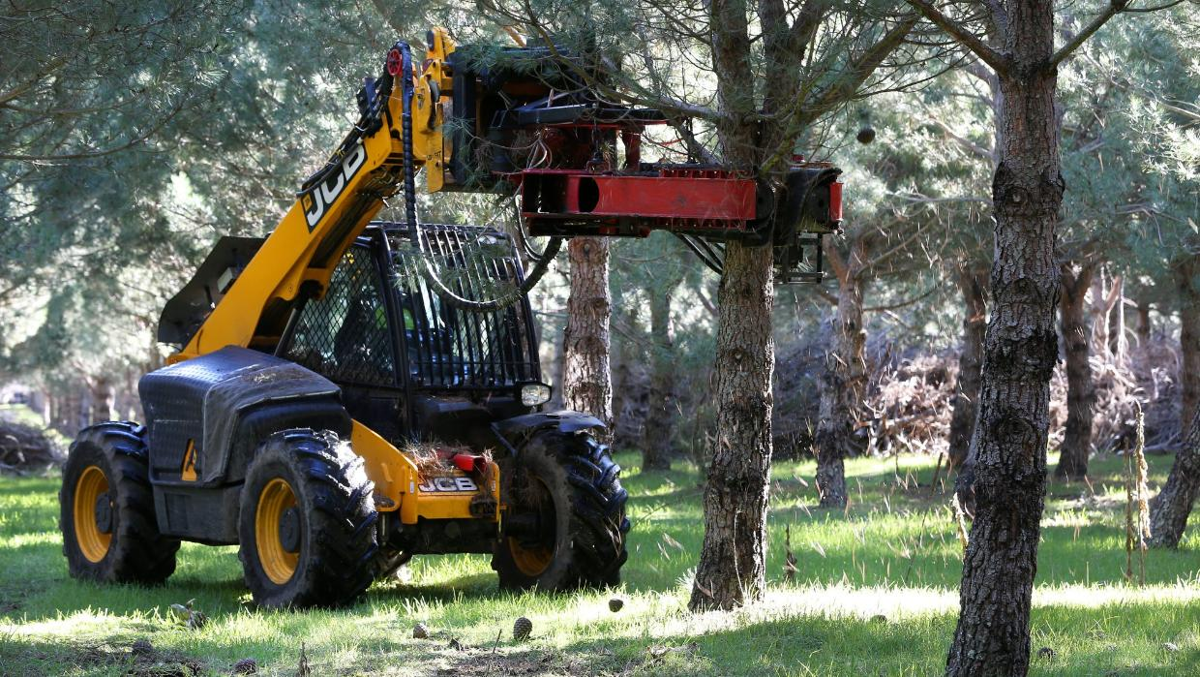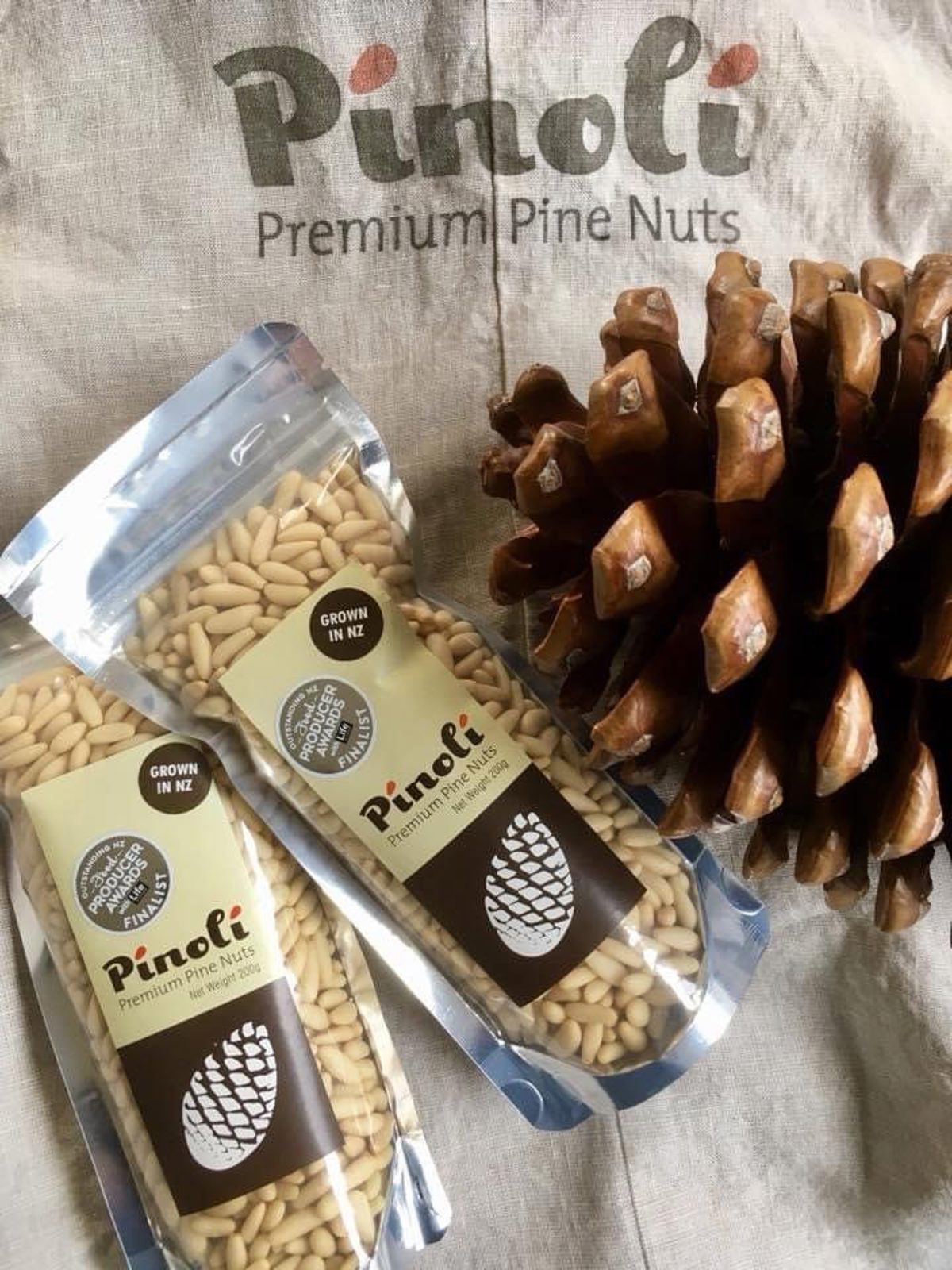Pinoli Pine Nut

In Marlborough, Pinoli isn't just asking this question, they're answering it through action.
Pinoli, an innovative agritech business, has reimagined what's possible in New Zealand's forestry sector. It stands today as the only commercial producer of Mediterranean stone pine nuts in the Southern Hemisphere, adding complementary value to Marlborough’s forest land.
Unlike most primary producers in New Zealand, Pinoli’s success is shaped by owning the entire production value chain, from the land and forests, to cone-harvesting, drying, extraction and processing of pine kernels, packaging, distribution, and international market relationships. This full integration enables them to deliver a consistently premium product gaining strong traction in high-value European markets, while maintaining quality and value at every stage.
This level of control ensures consistency, reliability, and timing, critical factors in building trust with global buyers. It also reduces reliance on third parties, allowing Pinoli to respond quickly to demand and make strategic decisions based on long-term market opportunities rather than short-term constraints.
From Concept to Cultivation
The Beginnings of Pinoli
The inspiration for Pinoli has deep roots in New Zealand's forestry history. The founders, Andy and Barbara Wiltshire sought to invest in a new type of production system, one that combined forestry tree species with food production. Lee Paterson was contracted to plan and plant the very first trees, establishing a working partnerships with Andy that has lasted over 25 years. A shared love of tree planting and a keen interest in diversification has kept them working together over the life of the project.
While plantation forestry was already well-developed in New Zealand, it was heavily dependent on one adaptable species, radiata pine. Meanwhile, food tastes were evolving, with growing interest in many international cuisines. Pine nuts seemed like an interesting option, expensive, nutritious and potentially could take advantage of the knowledge and skills already developed for growing pine trees well.
That idea led to targeted research and development in the early 1990s. At the time, Andy was involved with radiata pine seed orchards, using grafting and selective breeding techniques to replicate high-performing trees for commercial forests. His interest in genetics and propagation would become central to Pinoli’s approach.
They sourced seed of the European stone pine, Pinus pinea from as many different Mediterranean locations as possible, providing a broad genetic base for the venture.
Innovation in plantation technique
Research showed that Mediterranean pine nut producers were using grafting to improve yield, quality, and consistency. Andy and Lee developed a growing system in Marlborough that was designed to maximise productivity, reduce time to maturity, and grow in local conditions.
Initially, the effort and approach was to grow stone pine as a horticultural crop on flat, high-quality land, with wide spaced trees, early thinning, and a focus on maximum crown growth. This focused first on the wide range of genetics they had sourced, grown as seedling trees, but they also experimented with a pioneering system that grafts carefully selected Mediterranean stone pine varieties on to radiata pine rootstocks. This combination brought together the vigourous root structure of radiata pine with the Mediterranean pine’s large cones, seeds and premium kernel quality. The grafted trees reach maturity faster and produce higher yields over time, but are much more expensive to grow, and less robust. Stone pine is well-adapted to Marlborough’s climate, with its high sunshine hours, seasonal variation, and well-drained soils and the trees produce premium-quality kernels that meet the high standards of European buyers.
While the trees had proven they could grow well and produce first quality pine nuts, Andy and Lee also discovered a major problem with the horticulture system. The trees were growing so vigorously and strong that they were quickly turning into giant, shaggy bushes, becoming ever more difficult and more expensive to prune, and quickly outgrowing even the harvesting techniques they had planned for. They soon realised that before long, the system would need replacing. But replacing it would mean a massive clean-up job, clearing what would essentially be nothing more than firewood before new seedlings could be introduced.
The good news was that the stone pine clearly had potential, just not managed the way they had initially imagined. Instead of treating it like a horticulture crop, they saw an opportunity to manage it as a plantation forest tree species. Its exceptional survival, drought resistance and general toughness and adaptability to establish much larger scale forests on steeper and cheaper land.
Today, around 550,000 trees are planted on six properties across Marlborough, covering a total area of 540 hectares. These plantations are managed like a forests rather than orchards, inline with emerging with research from Spain showing that stone pine grown primarily as a forest species offers a higher expected return on investment than when grown as an orchard solely for cones and pine nuts. Even the original plantation has been transitioned into a forestry regime. Trial harvests and sawing tests have shown the excellent potential of the wood from stone pine, naturally durable, and much denser than radiata pine.
Solving the question of how to best grow the tree led to a new challenge: could cones still be extracted successfully from a dense, hill-country forests of stone pine?
They were clearly forests now, but could they still yield cone harvests in a way that was economically viable as an additional non-timber forest product?
Technology-driven production
Pinoli's harvesting and processing systems are designed for efficiency, scalability, and precision.
Pinoli's harvesting and processing systems have been carefully designed for efficiency, scalability, and precision. Once cones are ready, custom-designed tree-shaking machinery grips the trunk and efficiently dislodges mature cones, significantly reducing the need for manual labour. The machines were originally acquired from Europe but have since been further developed and refined in-house to suit different stages of plantations. Large equipment is used for mature blocks, and smaller more agile machines are deployed across younger plantations. This transition to scaled mechanisation has improved operational efficiency and helped future-proof the pine nut production system against labour supply pressures. Machines small enough to navigate through dense forests don’t have hydraulic power to generate enough energy to shake larger trees effectively. Solving this challenge required new thinking and adaptation of machinery and power systems, a current and ongoing area of innovation the Pinoli team is embracing.
Once collected, the pine cones move through a three-stage processing system developed specifically for Pinoli’s product and Marlborough’s climate. First, the cones are dried for several months, they are then mechanically cracked to release the seeds. The seeds are soaked and dried again to facilitate clean cracking and prevent kernel damage. Finally, kernels are dried, polished, washed and dried once more, before passing through advanced optical sorting technology that identifies and removes any discoloured or defective kernels. Only the highest-quality pine nuts continue through to packaging and export, a level of quality control that reinforces Pinoli’s reputation as a trusted supplier to international markets.

“When you're learning, you're happy. When you stop learning, life becomes boring,”
This philosophy drives Pinoli's commitment to owning every step of the production process, a key point of difference compared to Europe’s fragmented model, where pine cones often pass through multiple intermediaries before reaching the consumer. By controlling the process from tree to export, Pinoli ensures consistent quality, reduces inefficiencies, and maintains direct relationships with global buyers.
With global demand rising and traditional supply in Europe declining, Pinoli has built a strong foothold in premium export markets. Their pine nuts are particularly valued in Italy, where they are used by food manufacturers and high-end food service providers. By delivering consistency, quality, and traceability, Pinoli meets the standards of buyers looking for reliable alternatives to increasingly vulnerable Mediterranean sources.

Sustainability and Future Potential
Pinoli is now strategically positioned for new growth through sustainability initiatives that align environmental benefits with long-term commercial opportunity. The business is currently pursuing organic certification, which will open further access to premium markets and reinforce its commitment to sustainable growing practices.
Pinoli also sees future potential in the role of pine nut plantations as long-term carbon sinks. These permanent tree systems sequester carbon over decades, creating an opportunity to support New Zealand’s climate goals while strengthening the economic case for diversification in land use and long-term investment in emerging industries.
Stone pine offers a real alternative tree species in Marlborough’s driest and windiest hill country, particularly in areas where even the famously adaptable radiata pine finds its limits. As an added advantage, stone pine does not spread wildling trees into the landscape and uses its deep, massive root systems and longer-rotation cycles, to offer improved control over erosion and soil loss from sand dunes to clay and mudstone hills.
A blueprint for regional innovation
Pinoli’s journey from concept to market leadership reflects why Marlborough is emerging as a leading region for agritech innovation and commercial success. By combining technical capability with strategic vision and sustainable practices, the company has built a model that highlights the region’s natural strengths and innovative spirit.
As global markets increasingly look for reliable, sustainable, and traceable premium food products, Marlborough’s agritech businesses are well-positioned to deliver. In Pinoli’s pine forests and in its downstream pine nut business, we see how the region’s distinctive approach to land use, innovation, and export readiness is already generating real results, offering a blueprint for sustainable growth and a more diverse regional economy.






